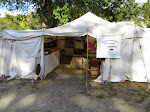I learned a lesson last weekend—a lesson about fortitude and perseverance. These are qualities needed to survive the 19th century experience. As our captain, Cleon Plunk, stated, “We really got a small taste of what it was like to live back then.”
Vaunda and I made the 6 hour drive to Booneville, MO for their 150th anniversary reenactment. We arrived Thursday evening and set up our tent, a process that takes about 8 hours total. We finished sometime around noon on Friday.
The weekend was hot. We kept cool by misting ourselves with water, and drinking. Lots of drinking. I had taken my bathtub, so we were able to cool off with a bath at night. The event coordinators had set up a water hose at the entrance to the site, so we had to carry our bath water a distance in a bucket, much like our predecessors had to carry it from a nearby stream. The bucket that we had was a canvas bucket which works, but water also seeps through the canvas so my skirts were soaked before I got back to camp. Two baths, two trips.
We dropped into bed Friday night (we sleep on an air mattress on the ground), and slept the sleep of the exhausted—until about 3 a.m. The people in the next tent woke us to warn us that a prairie storm was rolling in with wind speeds of up to 75 miles an hour. Shortly thereafter, one of the EMS trucks went through the camps with a bull horn, waking people and telling them that they had 10 minutes to batten down the hatches and get to their cars. I appreciated the warning. Often we don’t have that luxury.
The sutler coordinator organized the sutlers to pull their trucks and trailers in front of their tents to serve as a wind block. Because I had parked at the bottom of a hill, and it was dark and the terrain rough, I knew that I would probably have trouble getting my truck out, so I opted to leave it. Vaunda and I headed for the coordinator’s tent and got a lesson in what to do to prepare for a storm. We stayed there during the worst of the first storm. When the wind died down we went back to our tent to prepare for the next storm. We pounded the 2 foot stakes in further, moved displays and merchandise, and then, amid thunder and lightning, lay down to get some much needed sleep.
It stormed most of the night, and by morning, we had a nice, steady but gentle rain. The wind picked up a bit and whipped our tent, causing the sides to drop in spots. I set about fixing them. Vaunda joined me. Unbeknownst to us, the end of the storm was near, and with it, a strong gust front. We were trying to shore up a sagging side when it hit. I was at the corner pole, Vaunda at a side pole. I put my weight into it, and struggled to keep the tent upright, as did she. We struggled, and wondered how long the winds would last and how long we could continue to fight, and whether or not our tent would remain erect.
Finally, the wind died down. We dressed quickly and went out to survey the damage. Some tents were down. Their owners set about to re-pitch them and put their contents aright. I spent the day re-setting stakes, ropes and poles. We kept our eyes on the weather forecast, a luxury that the 19th century settlers didn’t have. Another night of storms was predicted.
I pulled my truck out of the hollow during the day, after the ground had a chance to dry. Right before night fall, all of the sutlers, again, pulled their trucks and trailers in front of their tents. All I could think of was that it was the 21st century equivalent of circling the wagons. And that we were sitting ducks. We had no place to go. No shelter, save our vehicles. Again, I went to bed amid the thunder and lightning. Fortunately, the storms were not severe. I slept until day break, when the rain finally stopped.
I was happy to pack up and head home Sunday evening. We were tired of battling wind, storms and heat. After we came home we had a severe thunderstorm and I didn’t even care. I was safe in my home, surrounded by strong walls and a roof over my head. I slept right through it, in fact.
This experience gave me a deep awareness and appreciation for those who lived and struggled with the elements 150 years ago. Nature can be very unkind. Without the characteristics of fortitude and perseverance none would have survived long on the prairie. For the weekend, at least, we followed in their footsteps, doing what needed to be done in the face of adversity, and persevering until the end of the weekend.
*My sincere thanks to the event organizers, the Missouri Civil War Reenactors Association, Dell and Jean Warren of James Country Mercantile and the EMS personnel who did such a fine job of hosting this event.*


No comments:
Post a Comment
Would love to hear your comments.